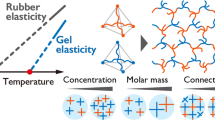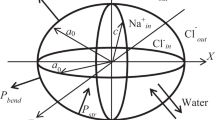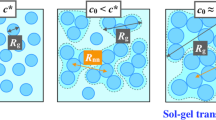Abstract
THE swelling of protein gels and tissues under the influence of acid or alkali is due mainly to osmotic forces set up on account of salt formation between the protein and the acid or base. Osmotic swelling always shows two well-marked maxima, one in the acid and one in the alkaline range, and it has generally been taken for granted that the pH-swelling curve should also show a sharply marked minimum corresponding to the iso-electric point of the protein. This misconception has arisen from the fact that the bulk of the work on the swelling and osmotic pressure of proteins has been done on gelatin and albumin, both of which show sharply marked minima, and where it is not unreasonable to assume that the protein molecules are present without any orientation.
This is a preview of subscription content, access via your institution
Access options
Subscribe to this journal
Receive 51 print issues and online access
$199.00 per year
only $3.90 per issue
Buy this article
- Purchase on Springer Link
- Instant access to full article PDF
Prices may be subject to local taxes which are calculated during checkout
Similar content being viewed by others
References
D. Jordan Lloyd, Proc. Roy. Soc., B, 89, 277; 1917.
NATURE, 127, 665; 1931.
Kolloid Z., 51, 10; 1930.
Author information
Authors and Affiliations
Rights and permissions
About this article
Cite this article
LLOYD, D. The pH Stability Region of Proteins and Osmotic Swelling. Nature 130, 24–25 (1932). https://doi.org/10.1038/130024c0
Issue Date:
DOI: https://doi.org/10.1038/130024c0
Comments
By submitting a comment you agree to abide by our Terms and Community Guidelines. If you find something abusive or that does not comply with our terms or guidelines please flag it as inappropriate.



